Major Campaigns
ILTF has four major campaigns you can support depending on your specific interests.
Beyond Land Acknowledgement Fund
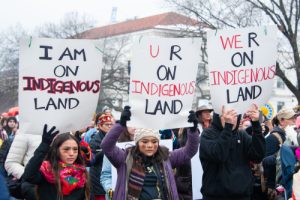
Empty words. To many in Indian Country, that’s what land acknowledgements are. As more and more local governments, universities and other organizations make land acknowledgement statements at press conferences, community gatherings and public events, it raises an obvious question: Now what?
Inspired by a $250,000 land acknowledgement gift from Holy Trinity Lutheran Church in Minneapolis, ILTF created the Beyond Land Acknowledgment Fund to provide a conduit for organizations, institutions, governments and the like to turn talk into action. From the transfer of government land to small donations collected in elementary schools, now there is an opportunity for anyone to act collectively on a much larger scale. ILTF has the experience and knowledge to put complex land transactions together as well as a proven record of sound fiscal management. There are countless historic and religious sites across Indian Country that are meaningful to tribal communities, as well as historic fishing and hunting land that could be returned.
Click here to read more about ILTF’s land recovery efforts.
To learn more about the ILTF Land Acknowledgement Fund please contact David Garelick via email at dgarelick@iltf.org.
Spirit of Sovereignty
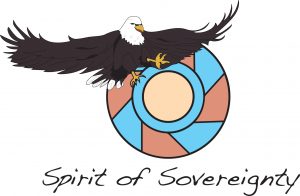
Established in 2002 as the charitable arm of the National Indian Gaming Association (NIGA), Spirit of Sovereignty is now a NIGA-advised donor fund at the Indian Land Tenure Foundation, an arrangement that allows for more funds to be spent in the community and less on administration. Primary funding comes from generous donations from Indian tribes, corporations doing business in Indian Country, other charitable foundations, and the generosity of Indian and non-Indian people alike. The fund supports a college scholarship program and the Native Children’s Holiday Program.
Learn more about Spirit of Sovereignty at spiritofsov.org.
Pe' Sla - The Heart of Everything

In December 2014, four Tribes of the Oceti Sakowin (Great Sioux Nation) purchased 437 acres of Pe’ Sla, a high mountain prairie in the Black Hills that is sacred to the Lakota/Dakota/Nakota Tribes. Pe’ Sla means “The Heart of Everything” and is central to the Oceti Sakowin traditional star knowledge and understanding of our place in the universe. The Black Hills, including the sacred site of Pe’ Sla, were reserved for the exclusive use and occupation by the Oceti Sakowin by the Fort Laramie Treaty of 1868 with the U.S. government. Once gold was found in the Black Hills, however, the U.S. illegally seized the lands despite the treaty agreement. Even though the gold is gone, the Hills still hold great natural, cultural and spiritual value.
In 2012, the first 1,900 acres of these sacred lands were purchased by the Oceti Sakowin Nations with assistance from Indian Land Tenure Foundation and Last Real Indians. Two years later, the owners of the original 1,900 acres put the remaining acreage of their ranch up for sale on short notice and the Tribes had to rush to save the Pe’ Sla sacred site once again. This key parcel of the culturally-significant property was reacquired in December 2014, and the Tribes continue to raise money to pay off the loan. Plans are under way to honor and preserve the prairie and holy site in various ways, including returning buffalo to Pe’ Sla.
Contribute to Pe’ Sla
Bear Butte Land Recovery Fund
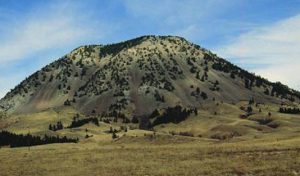
Native peoples residing in the Black Hills of South Dakota can trace their origins back thousands of years through their oral tradition, and the sacred site Bear Butte is a constant in these origin stories. The Black Hills, including Bear Butte, were reserved for the exclusive occupation and use of Indian people by the Fort Laramie Treaties of 1851 and 1868, but the land was illegally taken by the United States a few years later. In 1961, Bear Butte was designated a state park but much of the immediate surrounding area was left in private ownership. Located near Sturgis, S.D., this cultural and holy site has been under siege in recent years by encroaching commercial development fueled by the annual Sturgis Motorcycle Rally and other growth in the region.
The Cheyenne and Lakota tribes and people have been struggling to acquire private properties in the area so that religious ceremonies held on Bear Butte can be conducted without disruption from other land uses. The Bear Butte Land Recovery Fund helps support the tribes in these acquisitions. In late 2016, the Fund assisted five tribes in the purchase at auction of 270 acres at a cost of $1.3 million. More than 20 bidders participated in the auction, including business entities that planned to use the land immediately at the base of this sacred site for a giant adult entertainment facility. Thanks to your support, the immediate Bear Butte area is now more protected but much remains to be purchased.
Contribute to the Bear Butte Land Recovery Fund
Planned Giving
Consider including Indian Land Tenure Foundation in your estate or create a donor-advised fund to allow greater control over determining how and where your gift is used.
Bequests
Bequests are direct gifts designated in an individual’s will. Bequests can be established with almost any type of asset, such as cash, securities and life insurance, and can be in any amount. In addition, the donor can determine whether the funds will be “restricted” (used to fund a specific area of interest or organization) or “unrestricted,” which allows the Foundation to use the funds at its discretion. Any contribution you make, restricted or unrestricted, will forward the Foundation’s overall mission of helping Indian people to gain full control and management of their reservation lands.
Donor-Advised Funds
A donor-advised fund gives you, the donor, more control over how your contribution impacts the community. A flexible, affordable and effective charitable giving tool, donor-advised funds give donors the opportunity to actively participate in decisions regarding the distribution of their funds. Funds can be named to provide a lasting family legacy or to honor and remember a loved one. Donor-advised funds allow you or others you designate to propose making grants to the causes or organizations of your choice.
Field-of-Interest Funds
A field-of-interest fund allows you to make targeted contributions to general interest areas, such as land reclamation or K-12 education. The Foundation identifies organizations that fit your interests and then reviews and selects grantees and projects accordingly. Consider this giving option if you feel strongly about having your resources support a particular issue or a specific Indian land tenure strategy.
Designated Funds
A donor designated fund through ILTF provides ongoing, permanent support for a specific charitable organization that you identify when you make your gift. Not only will your contribution provide direct financial support to your favorite charity in perpetuity, your fund will also help the organization attract additional resources and gain exposure through ILTF’s marketing efforts, publications and website. ILTF staff can help you select an organization to designate based on your interests and our extensive knowledge of nonprofits working on Indian issues. Also, if at any time one of the charities in your fund ceases to exist, ILTF can work with you to find another organization that fits your values and interests.
Community Funds
ILTF’s Community Funds support land-related programs and initiatives throughout Indian Country. One hundred percent of your contribution is used to provide much-needed resources for projects that are important to Native nations and people.
Estate Planning & Probate Fund
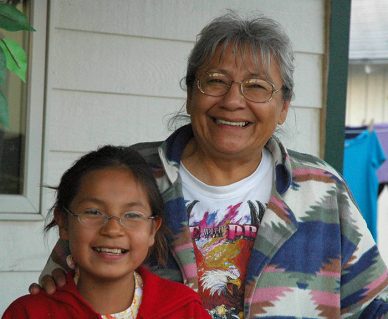
For more than a century, Indian families have seen valuable land resources diminish as fractionated ownership increases with each passing generation. ILTF supports estate planning as one of the most effective ways to stop the continued division of Indian land titles and ensure that Indian lands are controlled and managed by Indian people. ILTF has funded projects that provide education and free estate planning services for Indian landowners, including direct legal service and will writing assistance, as well as training programs for tribal chairpersons, landowners, attorneys and Indian land heirs. ILTF is now developing more efficient, cost-effective models to help Indian people safely transfer their lands to the next generation.
Contribute to Estate Planning & Probate Fund
Lessons of Our Land Fund
Most U.S. public schools fail miserably when it comes to teaching American Indian history and culture. Students learn little about the Indian nations and people who originally inhabited this continent, their diverse values or customs when it comes to ownership of land, or how land in the U.S. was “acquired” from the tribes. This is changing thanks to ILTF’s Lessons of Our Land curriculum, which brings culturally appropriate, locally relevant materials into the classroom. Lessons of Our Land gives educators the opportunity to incorporate relevant materials about American Indian land tenure into pre-existing curriculum while satisfying state and federal educational requirements. The curriculum provides all students with broader understanding of land, cultures, inherent rights and tribal sovereignty. Your gift will enable more students to appreciate our nation’s history and the importance of our relationship to the land. Perhaps more importantly, Indian students will see themselves and their ancestors reflected in their classroom materials, often for the first time.
Contribute to Lessons of Our Land Fund
Indian Country Cooperative Extension Fund
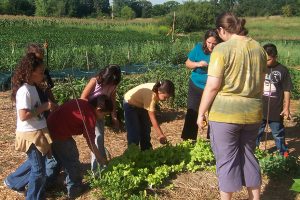
The Federally Recognized Tribal Extension Program (FRTEP) is a successful tribal community outreach model that is focused on agricultural productivity, youth development, and healthier communities. The Indian Country Cooperative Extension Fund (ICCEF) supports FRTEP extension agents and offices so that they can expand programming and move to multi-year funding cycles in implementing important programs with local partners, including tribes, tribal colleges and other institutions.
Learn more about the important work FRTEP agents are doing in Indian Country by visiting the website tribalextension.org.
Contribute to the ICCE Fund.
National Indian Carbon Coalition Fund
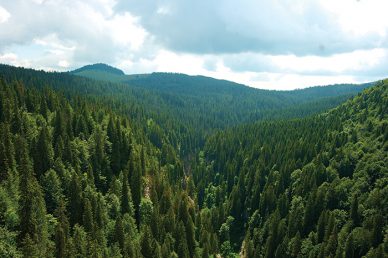
As climate change increasingly threatens our environment and way of life, governments, corporations and individuals are seeking viable solutions to reduce carbon emissions. One such solution is the emerging carbon sequestration market, which requires vast areas of open space and undeveloped land to capture carbon emissions. Indian Country contains some of the largest tracts of undeveloped or underdeveloped land in the nation. Formed by ILTF and the Intertribal Agriculture Council, the National Indian Carbon Coalition assists tribes and individual Indian landowners in understanding carbon credits, sequestration processes and the carbon markets. Your support will help Indian people maintain control of their assets and use carbon credit profits to empower their families and communities while preserving the environment.
Contribute to the NICC Fund
National Tribal Land Association and NTLA Conference Funds
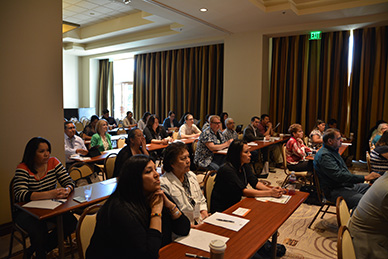
As Indian nations continue to effectively manage their land and natural resources, the need for education, training and networking among tribes is greater than ever. The National Tribal Land Association (NTLA) offers opportunities for tribal staff working in land-related areas to learn, share and network with their colleagues from other tribes to expand their knowledge and skills. ILTF acts as the Fiscal Agent for NTLA which raises funds for two separate initiatives:
The National Tribal Land Association Fund supports the NTLA organization as a whole in such areas as general operating support, association activities, and the design and development of a NTLA Certification Program for tribal land professionals. Contribute to NTLA Fund
The Tribal Land Staff National Conference Fund supports the annual conference, including expenses such as venue rental, printing of conference materials, and speaker honorariums. Contribute to NTLA Conference Fund
Native Land Law Fund
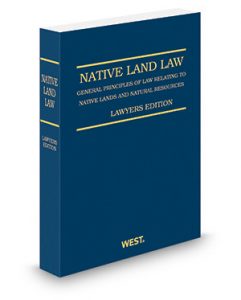
Precedent-setting U.S. Supreme Court Cases and unfair federal policies, such as the General Allotment Act, have led to severe social, economic and political hardship for many Native Americans. Unfortunately, the legal issues facing Indian people are little known and often misunderstood by non-Indians. As part of its legal reform strategy, ILTF partnered with the Indian Law Resource Center (ILRC) and consulted with leaders throughout Indian Country to develop a set of new legal principles relating to Native lands and natural resources that is advancing a more fair and just legal framework for Indian people. These principles, published in 2012 by Thomson Reuters as the legal treatise Native Land Law: General Principles of Law Relating to Native Lands and Resources, represent the first Indian-developed and tribally-supported statement of what the law should be. Your contribution helps Indian people to lead positive, empowering, enduring legal change.
Contribute to Native Land Law Fund
Treaty Signers Fund
From 1778 to 1871, Indian nations ceded the vast majority of their lands to the U.S. government through treaties which became the “supreme law of the land,” providing legally-based government-to-government agreements meant to guarantee that Indian nations retained certain rights and privileges, such as land use and occupation. Unfortunately, many of the lands guaranteed to Indian nations were illegally taken after the fact (e.g., the Black Hills) and remain out of Indian ownership and control today. ILTF’s Treaty Signers Project examines how business interests in land speculation, railroads, the fur trade, mining, forestry and others heavily influenced the treaty making process and were largely responsible for the loss of Indian land. In contrast to the “American Myth” which presents “pioneers” as the driving force of America’s past, this Project presents the economic engines that actually drove U.S. expansion and how U.S. treaty negotiators secured hundreds of millions of acres for themselves, their families and their business partners. Your support will help researchers make sense of the vast amount of scattered information on these critical events, and foster real discussion about our history.
Contribute to Treaty Signers Fund
Donor-Advised Funds
He Sapa Land Recovery Fund
The He Sapa Land Recovery Fund was established in 2023 by members of the Sinykin family, descendants of homesteaders who received free land from the U.S. government in South Dakota and settled there between 1900 and 1915. Contributions help to return Indian lands in the Black Hills (He Sapa) to Indian ownership and control.
Contribute to He Sapa Land Recovery Fund
Mato Sapa Fund
The Mato Sapa Fund was established to honor the long service of Ben Black Bear, Jr., who was a member of the Indian Land Tenure Foundation’s Board of Directors from inception until May 2007. Mr. Black Bear continues to serve as an advisor to the fund, which helps advance ILTF’s primary mission of returning reservation lands to Indian ownership and control.
Contribute to Mato Sapa Fund
Racine Land Investment Fund
The Racine Land Investment Fund was established in 2007 by ILTF board member Ross Racine. An expert in resource conservation and management and a member of the Blackfeet Tribe, Racine has spent his career working with Indian people in the development and management of their lands. His interest is in helping Indian people use their agricultural lands in a productive and sustainable manner in order to build strong tribal economies and ensure tribal self-determination. Ross’ greatest hope for his fund and the work of ILTF is that “reservation communities will be healthy and economically thriving because they have the ability to feed themselves through sustainable use of community-owned resources.”
Contribute to Racine Land Investment Fund
Margie Hutchinson Trust
The Margie Hutchinson Trust for Indian Land was established in 2007 by ILTF board member Margie Hutchinson to further ILTF’s charitable purposes and to benefit the community served by ILTF.
Contribute to Margie Hutchinson Trust
Virgil and Lynette Dupuis Fund
The Virgil and Lynette Dupuis Land Capital Fund was established in 2007 by then-ILTF board chair Virgil Dupuis to further ILTF’s charitable purposes and to benefit the community served by ILTF.
Contribute to Virgil and Lynette Dupuis Fund
Other Giving Options
General Operating Fund
Today more than half of all reservation land is owned by non-Indians. In addition, the complex legal principles surrounding Indian land tenure often make it impossible for Indian people to live or work on their own land. ILTF is dedicated to serving American Indian nations and people in the recovery and control of their rightful homelands. Your contribution will help promote education, increase cultural awareness, create economic opportunity, and reform the legal and administrative systems that prevent Indian people from owning and controlling reservation lands.
Contribute to ILTF General Operating Fund
Land Recovery Funds
ILTF maintains a general fund and specific funds that address the problem of land loss in Indian Country. Though its Land Recovery Funds, ILTF assists tribal nations with land acquisition, economic growth and self-governance.
Contribute to the general Land Recovery Fund.
Indian Land Capital Company Fund
Indian Land Tenure Foundation’s affiliate, the Indian Land Capital Company (ILCC), assists tribes in their efforts to consolidate and increase their land bases by providing financing to Indian nations for tribal land acquisition. As an Indian-controlled Community Development Financial Institution (CDFI), ILCC is uniquely positioned to provide loans that respond to the distinct needs of tribes. The Indian Land Capital Company Fund helps support tribal land acquisition efforts and strategic land planning at the tribal level.
Contribute to ILCC Fund
STOCK GIFTS
How to give stock to ILTF
There are many ways to support the work of Indian Land Tenure Foundation, including with a year-end gift of stocks or securities. Gifts of stock can increase the impact of your contribution and offer you a number of potential tax advantages. Please consult your financial planner or tax advisor for information on how this opportunity applies to your specific situation.
How to turn your gains into good
Under federal tax law, charitable gifts of appreciated, long-term stock may have a double benefit:
- The long-term capital gain may be excluded from taxable income to the extent allowed by law.
- The charitable contribution deduction is the fair market value of the stock.
To make a gift of stock, certificates held by a bank or broker can be electronically transferred to Indian Land Tenure Foundation. Please provide your broker the information below to make the gift transaction.
Charles Schwab & Co.
IS Document Control
1945 Northwestern Drive
El Paso, TX 79912
Tax ID #: 94-1737782
DTC #: 0164, Code 40
Indian Land Tenure Foundation
151 County Road B2 East
Little Canada, MN 55117
Acct #: 3137-1507
Tax ID #: 41-2014273
Please alert us in advance so we can anticipate your contribution.
Contact: David Garelick, Corporate Relations Officer. (email: dgarelick@iltf.org, tel: 651-766-8999)
Thank you for your support!
GLOSSARY OF FINANCIAL TERMS
When exploring planned giving with ILTF staff or a trusted financial planner, you may run across new or unfamiliar terms. This glossary of terms we use might be able to help.
Life Estate
- Gift of property in which the donor retains the right to use the property for life.
Life Income Agreement
- Gift of a principal sum, property or securities with a stipulated life income paid to the donor or another person for his or her lifetime.
Life Income Trust
- Plan whereby gift assets are placed in trust for the lifetime benefit of an income beneficiary with the remainder going to another beneficiary.
Personal Property
- Assets other than land, such as tangible personal property (jewelry, artwork, antiques) and intangible personal property (stocks, bonds, notes).
Probate
- Process of proving a will’s validity, commonly used to mean the administration of an estate.
Real Property
- Land property-related assets, includes land and buildings.
Remainder
- Amount remaining in a trust after income payments have ended.
Revocable Trust
- Trust that can be changed or dissolved at any time by the grantor.
Testamentary Trust
- Trust established through the will of a grantor.
Trust
- Arrangement in which property is held by an individual or institution for the benefit of others.
Trustee
- Party legally responsible for carrying out the terms and performance of a trust.
Will
- Legal instrument disposing of a person’s property at the time of his or her death.
INDIAN LANDS IN INDIAN HANDS
Certain states require written disclosures for nonprofit organizations soliciting contributions. Individual state disclosures are as follows. Florida: A copy of the official registration and financial information may be obtained from the Division of Consumer Services by calling toll-free, within the state, 1-800-435-7352 (800-HELP-FLA), or visiting www.FloridaConsumerHelp.com. Registration does not imply endorsement, approval, or recommendation by the state. Florida Registration #CH21932 Georgia: A full and fair description of our programs and our financial statement summary is available upon request at our office and phone number indicated above. Maryland: For the cost of copies and postage, from the Office of the Secretary of State, State House, Annapolis, MD 21401. Mississippi: The official registration and financial information of ILTF may be obtained from the Mississippi Secretary of State’s office by calling 1-888-236-6167. Registration by the Secretary of State does not imply endorsement. Nevada: Contributions may be tax deductible pursuant to the provisions of sec. 170(c) of the Internal Revenue Code of 1986, 26 U.S.C. ¤170(c). New Jersey: Information filed with the attorney general concerning this charitable solicitation and the percentage of contributions received by the charity during the last reporting period that were dedicated to the charitable purpose may be obtained from the attorney general of the state of New Jersey by calling (973) 504-6215 and is available on the Internet at www.state.nj.us/lps/ca/charfrm.htm. Registration with the attorney general does not imply endorsement. New York: Upon request, from the Attorney General Charities Bureau, 120 Broadway, New York, NY 10271. North Carolina: Financial information about this organization and a copy of its license are available from the State Solicitation Licensing Branch at 1-919-814-5400. The license is not an endorsement by the state. Pennsylvania: The official registration and financial information of ILTF may be obtained from the Pennsylvania Department of State by calling toll-free, within Pennsylvania, 1-800-732-0999. Virginia: From the State Office of Consumer Affairs in the Department of Agriculture and Consumer Affairs, P.O. Box 1163, Richmond, VA 23218. Washington: From the Secretary of State at 1-800-332-4483 or http://www.sos.wa.gov/charities/ West Virginia: West Virginia residents may obtain a summary of the registration and financial documents from the Secretary of State, State Capitol, Charleston, WV 25305. Wisconsin: A financial statement of the charitable organization disclosing assets, liabilities, fund balances, revenue and expenses for the preceding fiscal year will be provided to any person upon request. Registration with a state agency does not constitute or imply endorsement, approval or recommendation by that state.